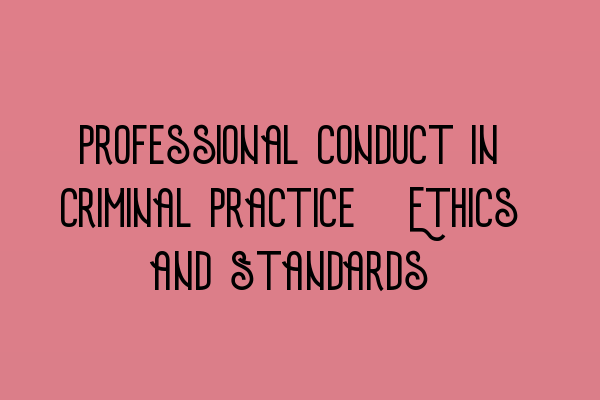Professional Conduct in Criminal Practice: Ethics and Standards
As a criminal law practitioner, maintaining professional conduct is of utmost importance. Professional ethics and standards not only define your reputation but also play a crucial role in upholding the integrity of the legal profession. Understanding the ethical guidelines and abiding by the standards set by regulatory bodies like the Solicitors Regulation Authority (SRA) is essential for every criminal law professional. In this article, we will explore the key aspects of professional conduct in criminal practice.
Ethical Obligations
When practicing criminal law, it is essential to uphold a set of ethical obligations. These obligations encompass a wide range of responsibilities, including:
- Ensuring confidentiality of client information
- Acting in the best interests of your client
- Avoiding conflicts of interest
- Maintaining client-attorney privilege
- Providing competent and diligent representation
These obligations are crucial for building trust and preserving the confidentiality, rights, and interests of your clients.
Standards of Professional Conduct
The SRA sets forth the standards of professional conduct that criminal law practitioners must follow. These standards cover various aspects of legal practice, including:
- Integrity and honesty
- Independence
- Confidentiality
- Relationships with clients and the court
- Competence
- Avoidance of conflicts of interest
Adhering to these standards not only ensures ethical practice but also enhances your credibility as a criminal law professional.
Continuing Professional Development (CPD)
As part of maintaining professional standards, participating in ongoing professional development is essential. Continuous learning and staying up-to-date with the latest developments in criminal law enable you to provide the best possible representation to your clients.
There are various CPD programs and courses available specifically designed for criminal law practitioners. These programs cover a wide range of topics, including:
- SQE 1 Preparation Courses
- SQE 2 Preparation Courses
- Practice exam questions, like the ones found in SQE 1 Practice Exam Questions
- Practice mocks, such as SQE 1 Practice Mocks FLK1 FLK2
- Stay up-to-date with SRA SQE Exam Dates
By actively participating in CPD programs and keeping your knowledge current, you can ensure that you are providing the highest level of representation to your clients.
Conclusion
Professional conduct in criminal practice is vital for maintaining ethical standards and upholding the reputation of the legal profession. By understanding and fulfilling your ethical obligations, adhering to the standards set by regulatory bodies, and engaging in continuous professional development, you can enhance your skills, build trust with your clients, and excel in your career as a criminal law practitioner.
